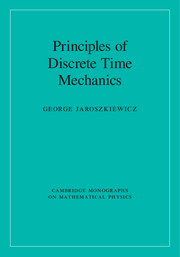Book contents
- Frontmatter
- Contents
- Preface
- Part I Discrete time concepts
- Part II Classical discrete time mechanics
- Part III Discrete time quantum mechanics
- Part IV Discrete time classical field theory
- Part V Discrete time quantum field theory
- Part VI Further developments
- 28 Space, time and gravitation
- 29 Causality and observation
- 30 Concluding remarks
- Appendix A Coherent states
- Appendix B The time-dependent oscillator
- Appendix C Quaternions
- Appendix D Quantum registers
- References
- Index
29 - Causality and observation
from Part VI - Further developments
Published online by Cambridge University Press: 05 May 2014
- Frontmatter
- Contents
- Preface
- Part I Discrete time concepts
- Part II Classical discrete time mechanics
- Part III Discrete time quantum mechanics
- Part IV Discrete time classical field theory
- Part V Discrete time quantum field theory
- Part VI Further developments
- 28 Space, time and gravitation
- 29 Causality and observation
- 30 Concluding remarks
- Appendix A Coherent states
- Appendix B The time-dependent oscillator
- Appendix C Quaternions
- Appendix D Quantum registers
- References
- Index
Summary
Introduction
Throughout this book we have commented on the need to have a wider vision of physics as more than merely developing and solving equations of motion for states of systems under observation (SUOs). It is our premise that any attempt to discuss time needs to address issues such as the status of observers, apparatus, and suchlike, relative to those states of SUOs. This echoes the following quote from Wheeler:
Stronger than the anthropic principle is what I might call the participatory principle. According to it we could not even imagine a universe that did not somewhere and for some stretch of time contain observers because the very building materials of the universe are these acts of observer participancy. You wouldn't have the stuff out of which to build the universe otherwise. This participatory principle takes for its foundation the absolutely central point of the quantum: No elementary phenomenon is a phenomenon until it is an observed (or registered) phenomenon.
(Wheeler, 1979)We agree with Wheeler to this extent: there seems little, if any, point in speculating about truly unobservable parts of the Universe. If, however, there is a possibility that physical signals or effects from currently unobserved parts of the Universe might one day reach us, then that would in essence make those parts observable, albeit indirectly, and therefore suitable for theoretical analysis and speculation.
- Type
- Chapter
- Information
- Principles of Discrete Time Mechanics , pp. 333 - 340Publisher: Cambridge University PressPrint publication year: 2014

